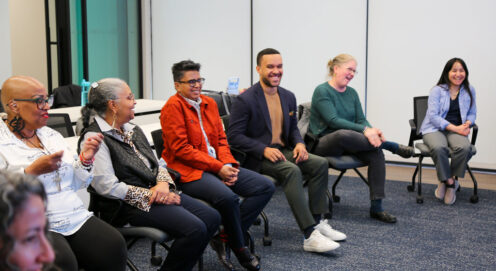info for
Community Partners
Each of SP2’s master’s degree programs include experiential education components that enable students to apply their learning in real-world scenarios.
- The Master of Science in Social Policy (MSSP) program gives students the autonomy to independently select or identify their own organization to complete a policy-related internship.
- The Master of Social Work (MSW) program partners with organizations that can provide opportunities for students to develop knowledge, practice skills, and provide experiences that will assist the student’s integration of classroom learning and professional training and development while at the organization.
- The Master of Science in Nonprofit Leadership (NPL) program offers students a hands-on, career-focused experience through a Leadership Practicum mentoring and leadership development experience with an executive-level leader at a local, national, or international social impact organization.
Negotiations for the development of a host site for students in an agency may be initiated by either the agency host site or the School of Social Policy & Practice (SP2).
Collaborative initiatives between all three master’s degree programs at SP2 work to identify and engage host community partner sites with the capacity to offer learning opportunities for all three kinds of students, when possible, for an academic year, as well as conduct community engaged research. These sites may also become specialized HUBs for professional education training offered to students and agency staff, working across disciplines with students, sharing resources, fostering collaboration among sites doing similar work, and identifying challenges and advocacy needs of community partners. HUBs will also be sites for community engaged research conducted in a collaborative model with the community partners, faculty, and students to address partner needs.
Interested in hosting a policy internship?
The MSSP program is two-pronged; the Master of Science in Social Policy (MSSP) is the basis of the degree obtained and one of the programs. Some students choose to enroll in the MSSP+DA program, which provides a comprehensive certificate in data analytics and prepares students for a data approach to social policy.
Host Organizations
In order to qualify as an internship partner, host organizations must meet the following criteria:
- Social policy related; if seeking an MSSP+DA student, the internship must be both social policy and data analytics related
- Capacity to accommodate a student for a minimum of 150 hours during the academic term, usually the summer term for MSSP students and the spring term for MSSP+DA students
- Ability and willingness to provide a varied array of assignments and projects that encourage the student to build on their existing skills and immerse themselves into social policy
- Capability to provide support and guidance for the student, working with the MSSP program administration if needed, and providing comprehensive feedback
- Openness to working with international students
MSSP and MSSP+DA students may identify their own internship opportunities or choose to connect with an existing site partner. A partnership with MSSP does not guarantee an internship placement.
MSSP Partners
The policy internship is intended to provide students with real-world experiences applying their classroom learning and research skills in activities such as policy analysis, data analysis for social policy, policy research, policymaking, advocacy, policy implementation, policy communications, and policy evaluation activities (to name a few). Internships may span all types of agencies and organizations, including non-profits, research institutions, advocacy organizations, think tanks, state and local government, federal government, for-profit institutions, and private foundations.
Contact
If you are interested in hosting a social policy student, please contact the MSSP Program at msspprogram@sp2.upenn.edu or Charlotte Rohrer, Program Coordinator for the MSSP Program, at crohrer7@upenn.edu.
Interested in hosting a Leadership Practicum student?
Leadership practicums are mutually beneficial partnerships that work collaboratively to drive social change and foster lasting impact.
In order to be considered as a practicum placement, host organizations must align with the criteria set forth by the NPL Program:
- Capacity to accommodate a student for the duration of an entire academic year, spanning from September through April
- Proficiency in offering students a varied array of projects encompassing fundraising and philanthropy, strategic planning initiatives, board development, brand management, program evaluation, consulting, volunteer management, and grant writing, among other areas, to enrich their learning experience
- Ability to offer tailored projects that not only align with the school’s curriculum but also consider the student’s existing skill sets
- Capability to engage in weekly one-on-one meetings with the students, providing personalized guidance and support, while also facilitating exposure to various levels of the organization and its members
- Dedication to evaluating student’s performance and actively contributing to their ongoing growth, fostering continuous improvement and development
Students may choose to identify their own placement or take part in a mutual matching process facilitated by the program. Organizations wishing to participate in the mutual matching process must confirm their interest by the spring before the academic year starts.
NPL Host Organizations
The Leadership Practicum is an integral part of the experiential learning for students in the NPL Program. The goal of the Leadership Practicum is to engage each student in a professional learning process, which enhances their understanding of how leadership acts are carried out in social impact organizations. Another goal is to foster a recognition and commitment by leaders that the social impact sector is the beneficiary of active mentoring and cultivating the next generation of transformative leaders. This is an opportunity for each student assigned to an organization to witness leadership in action and benefit directly from individual mentoring and leadership development.
NPL Practicum Mentors
The mentoring experience allows our students to interact, engage, and learn from a seasoned leader in the nonprofit sector. The mentor will share their experiences and allow the student to be a participant observer in key processes within their organization. The goal is to provide an environment for organic learning and opportunities to witness events in which leadership skills are demonstrated in real time (e.g. attend board meetings and other high level meetings; review budgets; engage in development planning efforts; participate in strategic planning; marketing strategy; discuss partnerships with other organizations; participate in fundraising or community events; support advocacy activities; and guide monitoring and evaluation of activities). The relationships can serve as a professional network for both parties. The practicum is rewarding for the mentor and host organization by providing them an opportunity to have a fresh, eager, and talented graduate student assist them as they navigate through some of the leadership challenges facing the organization.
Contact
If you are interested in hosting a nonprofit leadership practicum student, please contact Sue Perls, Associate Director for the MS in Nonprofit Leadership Program at sueperls@upenn.edu.
We look forward to connecting with you to develop mutually rewarding partnerships to engage and develop the students in our professional programs. There are valuable professional learning and training benefits to be gained by students exposed to the depth and breadth of the work at organizations. SP2 experiential learning is an opportunity for your organization to play a vital role in the student’s professional development while being engaged in projects that are meaningful and important to the work of your organization. We believe a SP2 student will be an asset to your teams, integrating their education and experience, along with the enthusiasm and professionalism regarding their contributions to the work.
Quick Links
mssp Internship Resources
MSW PRACTICUM Education Resources
npl Practicum Resources
Penn Information & Resources
ONE STEP AHEAD: Security & Privacy Made Simple
Wellness Information
Events
07/23

Virtual NPL Faculty Roundtable
The virtual faculty roundtables will be composed of professors who teach courses in the NPL program. Students will gain knowledge of the classroom experience and build connections with professors.
Events
08/06

SP2’s Staff and Faculty Summer Gathering
Please join us for food, games and fun at SP2’s staff and summer gathering!
News
Faculty & Research
06/17

Report: Newark guaranteed income pilot shows positive financial, health, family, and housing impacts
New research from the Center for Guaranteed Income Research (CGIR) at Penn’s School of Social Policy & Practice (SP2) offers insight into the efficacy of different forms of unconditional cash transfers and reveals the positive impact of guaranteed income on low-income families in Newark, NJ.
Contact Us
MSSP Program
Charlotte Rohrer, Program Coordinator
MSW Program
J. Grant, Community-Engaged Professional Education Director
NPL Program
Sue Perls, Associate Director
Interested in hosting a Social Work Practicum student?
Collaboration and partnership with Social Work Practice Agencies
To qualify as a social work practicum placement site, agencies must meet the MSW Program’s criteria:
MSW students are not required or encouraged to find their own social work practicum placements; the MSW Program staff should be contacted to facilitate placement opportunities and agreements.
Practice Agency Site Instructors (Supervisors)
Practice agency education is a critical part of Penn’s Master of Social Work (MSW) program. The Council on Social Work Education (CSWE) defines practice education as its signature pedagogy. The intent of practice education is to connect the classroom’s theoretical and conceptual contribution with the practical work of an agency setting. Agency practice education is systematically designed, supervised, and evaluated based on criteria developed in accordance with CSWE education standards. Agency placements are determined based on academic expectations, the students’ educational needs and objectives, and agency opportunities.
Selection of Practice Agency Site Instructors
Supervision and site instruction can be an extremely exciting, challenging, and demanding activity. In most instances, assuming responsibility for students’ supervision is an addition to one’s on-going duties. Although many other persons in the practice agency will be called upon to provide educational experiences, the student’s immediate supervisor or site instructor is the key person responsible for the student’s learning at an organization or site. Because of this, certain criteria should be considered in taking on this educational function.
Basic Requirements for being a Site Instructor:
Contact
If you are interested in hosting a social work practicum student, please contact J. Grant, Community-Engaged Professional Education Director, at grantj1@upenn.edu.